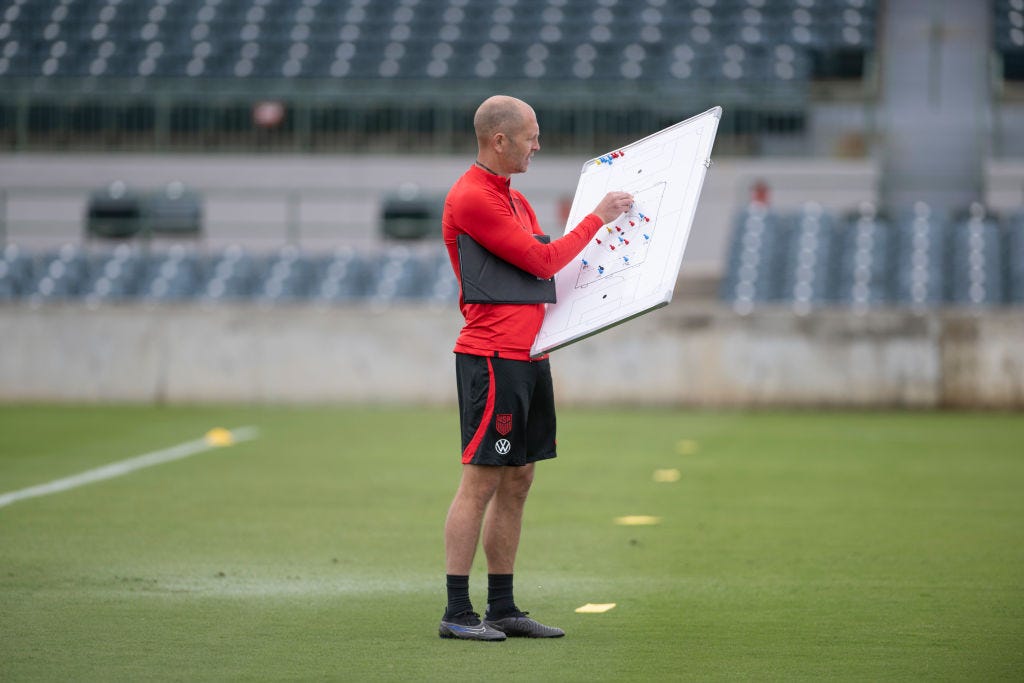🇺🇸 The hate he gets: CNL starts pressure-packed World Cup run-in for Gregg Berhalter ... he hopes
The USMNT manager says he welcomes the increasingly high expectations that come with more eyeballs on his team.
This is the third feature on an entrant in the Concacaf Nations League Final Four. Here are the pieces on Panama and Jamaica. Subscribe for more from the Concacaf region!
The pressure is on United States national team manager Gregg Berhalter.
It now doesn’t matter when you read ^this^ sentence.
Berhalter’s United States squad heads into the Concacaf Nations League Final Four as the back-to-back champion and favorite to lift the trophy once again.
That kicks off a stretch of tournaments for the United States in which it consistently needs good results.

After the CNL there’s the Copa América, the biggest barometer the U.S. will get before the 2026 World Cup that it’s on the right course, that technical director Matt Crocker made the right call to bring Berhalter back as U.S. manager after his brief separation after the 2022 World Cup. It is not the last exit on the road, but it’s the easiest one for Crocker to take if he decides that decision was an error.
After Copa América, there’s another Nations League and a Gold Cup - surely a team that will compete in 2026 can win the Concacaf competitions - and then it’s time for the big stage.
Berhalter - or whoever leads the U.S. into the 2026 World Cup - is going to be the most scrutinized coach in the history of the United States. With the growth of the sport in the U.S., more people care about the U.S. men’s national team than ever before. With the talent level of players in the pool, expectations have risen as well.
“I think it’s great. I think it’s great there’s a lot of interest in soccer in America at this time. I think it raises the level,” Berhalter said at a news conference this month. “When I look at our group in particular, it’s all part of it. The guys are playing for big clubs, clubs where they have to win every game, so they’re used to that type of pressure.
“For us as a group, we know that we want to achieve a lot, and any time you put yourself out there, any time you have really high expectations, there comes a lot of pressure. That’s all part of it.”
It’s absolutely part of the job now, and it will only be more and more a part of it with these high-profile tournaments on the horizon.
With the World Cup on American soil, the existing U.S. sports media machine will be humming with USMNT takes. There is an expectation within our soccer niché, which you are likely part of if you are reading this newsletter, that soccer specialists will be elevated and amplified. That may happen some, but the likelihood is soccer will instead be jammed into the typical diet of the American sports fan with the existing talking heads doing more talking about the Stars and Stripes.
That means we are closer than we realize to Stephen A. Smith going on a rant about how Berhalter deploys Gio Reyna. Colin Cowherd will have Cade Cowell takes.
There are benefits to that as well. Jurgen Klinsmann was a known name to fans of global soccer, but should Berhalter be the man leading the team into the 2026 World Cup, he will truly become a household name. The Q Score will go up as sports fans yet to dip into soccer and news hounds who watch the major networks all are increasingly exposed to Berhalter - and his tactics.
He experienced some of this ahead of 2022, doing media hits with big broadcasters and general-interest publications like GQ.
But if the U.S. can’t meet the lofty expectations set out for it when hosting the World Cup, the criticism will come not just from a loud contingent of Twitter users and YouTube channels but from the entire sporting press.
“We work really hard on minimizing that, staying in the present moment and really focusing on game to game and doing the best possible game we can each and every time we have the opportunity,” Berhalter said in regards to coping with the favorite tag this month.
For years, fans in the U.S. have been able to look south to Mexico and understand that you can’t simply criticize your way into having a better national team program.
Yet, some have wondered why there isn’t more intensity around the coaches and players on the national team and leaders of the USSF. With the friction between the USSF and MLS seeping into the public eye during controversies about the U.S. Open Cup and officiating, in many ways it seems that the U.S. is having a coming-of-age moment as a soccer country.
Angry columnists, furious fans in the reply of every tweet and power struggles between a the federation and a league are old hat in plenty of countries around the world. For so long in the U.S., however, there has been a more peaceful environment. The enemy was anyone who might threaten the growth of the game.
Now, there are plenty of people who feel that Berhalter himself is an enemy to that growth. Were he to be deploying a different scheme or calling in different players, the logic goes, the U.S. would win more often. More wins=more exposure. More exposure=more fans. More fans=more money and resources.
It’s safe to say that’s not how the leaders at U.S. Soccer or many of the current squad members feel.
“The group loves Gregg because Gregg loves the group,” midfielder Yunus Musah told TUDN’s Michele Giannone this week. “He helps us a lot outside the field, and that’s key, the treatment as people first. We give everything for him on the field.”
Dealing with the human beings means helping guys block out noise from outside that may not be helpful.
When Berhalter was part of the U.S. national team, he would’ve dreamed of as many people analyzing games in minutiae as do now. Instead, he had more expectations on him as a defender in the Bundesliga with Energie Cottbus than with the U.S.
Now, he’ll be shielding them from the fiercest analysis yet, whether fair or from a voice educated on the sport or not.

And, of course, he’ll be facing that criticism himself. Berhalter managed the messy situation after the World Cup that saw his job put on the line with grace.
The tactics and the ideas may or may not be good enough for the U.S. to reach the goals the team is setting internally or the hopes an increasingly expectant soccer nation has as the World Cup returns to these shores.
Those results, though, is what Berhalter must be judged on - starting Thursday against Jamaica, then Sunday, then this summer, and, if he gets it right, until June 12, 2026 at SoFi Stadium.







